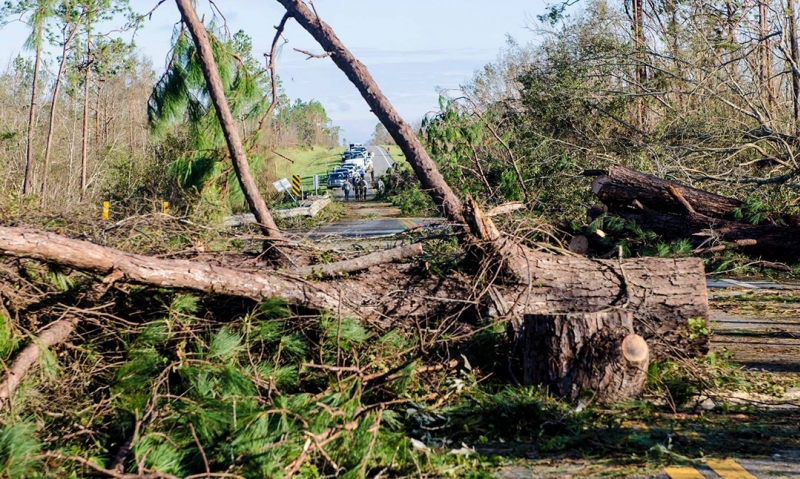
Recovery from Hurricane Michael will be a long, slow process
The recovery effort in the Florida panhandle in the aftermath of Hurricane Michael will be a “long haul,” Stephen Shuga said.
The past commander of the Department of Florida is handling logistics for The American Legion’s relief efforts in the state after overseeing relief efforts following Hurricane Irma during his term as department commander last year.
Thursday morning, eight days after Michael made landfall near Mexico Beach, Shuga was on his way to Perry, Fla., to meet the rest of the Florida American Legion Hurricane Disaster Relief Team to load up supplies and begin supporting Legion posts and their communities in outlying areas directly affected by Hurricane Michael.
“What we’re attempting to do on this trip is to scout out locations for future points of distribution,” Shuga said.
He noted that it will be some time before they’re able to get into the areas most devastated by Michael; there’s still a curfew in Mexico Beach and many areas are still without power.
“The grid’s just destroyed,” he said. “… This is going to be a long activity, we need to pace ourselves.”
Still, Legion Family across the nation are reaching out to help those affected by Michael, and those still dealing with the aftermath of last month’s Hurricane Florence.
The Department of Florida has begun collecting donations from their website and many posts throughout the state have begun collecting relief supplies, Florida Assistant Adjutant Bruce Comer said. And he noted that a post in Ohio has committed to moving supplies their way once collection points have been set up.
Shuga added that Legion Family in Maine, New Jersey and Pennsylvania have also offered support. He said the major needs right now include water, insect repellent, canned foods, and tarps.
“When it comes down to it in a couple of months, the need will shift to building supplies, mattresses and bedding,” he said.
In McDonough, Ga., Post 516 Commander Alton Head helped organize a collection of bottled water to send to North Carolina, where they’re still dealing with flooding after Florence, which was exacerbated when Michael moved through the state as a tropical storm. As Head told WGCL-TV, “They said they’re still two feet underwater, and this last hurricane kind of put some more on them.”
The tractor trailer filled with bottled water left this week from McDonough, headed to Fayetteville, N.C.
In Spring Lake, north of Fayetteville, Post 230 is renovating for a second time after a hurricane. Hurricane Matthew in October 2016 flooded the post, and floodwaters from Hurricane Florence have again forced the need for repairs. Post Adjutant Mark Erskine told the Fayetteville Observer, “Some members had the attitude initially to just give up, but I said ‘No we can’t do that. We’ve started from scratch before and can build up.”
While Virginia and South Carolina have dealt with flooding after the hurricanes, departments in those states haven’t yet received requests for National Emergency Fund (NEF) assistance.
The National Emergency Fund is available for American Legion and Sons of The American Legion members who have been impacted by #HurricaneMichael, as well as Legion posts. The NEF provides up to $3,000 for Legion and SAL members with an active membership who have been displaced due to damages to their primary residence, and up to $10,000 for posts that have been damaged by a natural disaster and whose programs and activities within the community are impacted. To apply for an NEF grant, please visit www.legion.org/emergency.
